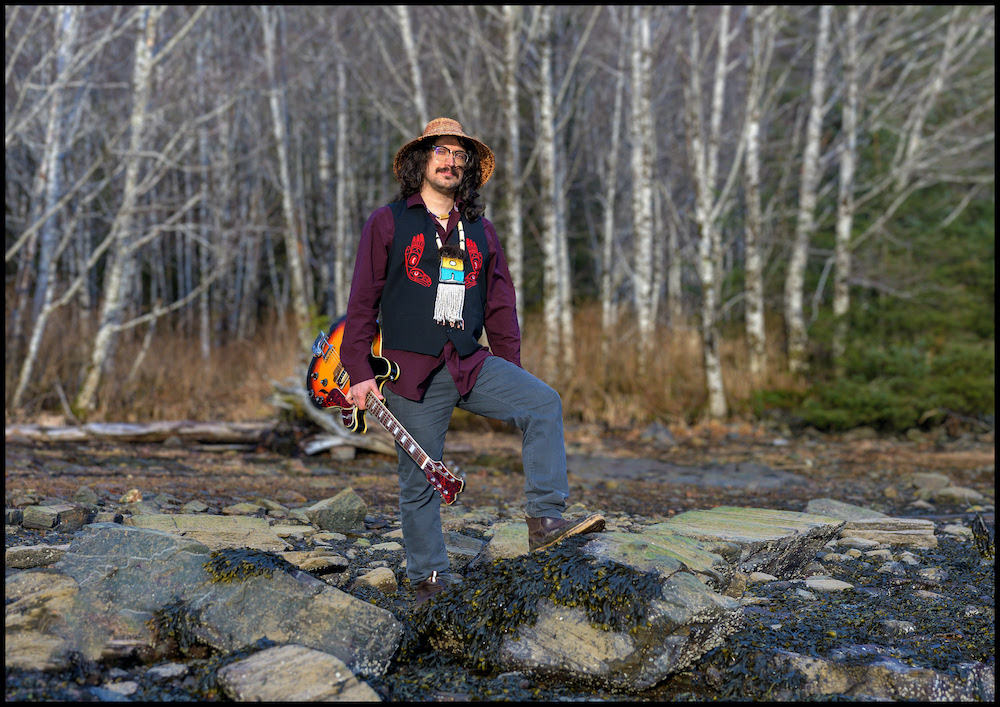
- Details
- By Neely Bardwell
Saltwater Hank’s new album, sung entirely in his ancestors’ traditional Indigenous language, is both a “stamp in time” and an “act of resistance” according to the Ts’msyen folk artist from Prince Rupert, British Columbia.
Written entirely in Sm'algyax, the traditional language of the Ts’msyen people, the record G̱al’üünx wil lu Holtga Liimi is set to be released July 1, Canada Day.
Saltwater Hank is the moniker used by Jeremy Pahl, a member of the Gitga’at Ts’msyen community in northwestern Canada. Pahl took the name Hank, as his father and great-uncle were both named that. When he is not writing music, Pahl works in the archives of the Ts’msyen nation, teaching and studying the Sm’algyax language.
This album has been in the making for several years now, Pahl said.
“I kept changing my mind on a lot of different sounds and chord structures. It got to a point where I was like, ‘I just need to put it out’,” explained Pahl in an interview with Native News Online. “Albums are always just a stamp in time. I needed to be satisfied with this piece and just put it out because I need to; I should.”
Sm'algyax is a traditional language spoken in northwestern British Columbia and southeastern Canada that dates back thousands of years. The word Sm'algyax means “real or true language.”
Pahl’s embrace of traditional language on his new album means something extra in a country that created federal legislation aimed at “killing the Indian in the child,” as Canada’s first prime minister, John A. Macdonald, once said.
“The fact that I’m singing in my language is an act of resistance,” he says. “Over 150 years after Macdonald and being able to still speak and sing in our language … This really goes to show that he failed. We succeeded in keeping our language and our musical traditions alive.”
Pahl explains the primary goal of the album is to connect with other Ts’msyen people who are looking to understand their own language. Asked what advice he would give to those who are working to reconnect with their traditional language, he preaches patience.
“I think it's important to have a healthy balance of both the openness to being corrected and not having a thick skin. Being able to pick yourself up and dust yourself off and say ‘Okay, this is okay. I'm not going to be perfect in my language immediately.’ Be gentle with yourself, be patient with yourself, and it'll come,” Pahl said.
“The old people say that the ancestors can hear you when you're speaking. And they're going to be happy with whatever amount of effort you're putting in because a lot of us, we're stuck in the hamster wheel of capitalism, and we don't have as much time as we want to be spending on the language, and with that comes a lot of guilt.
“The thing is, no matter what, who we are, and where we come from, we're always enough.”
In addition to Pahl’s album and other living fluent speakers, the Ts’msyen have begun to provide language resources online including videos and old film footage of fluent speakers having conversations with each other. When he has time, Pahl will go through and add subtitles to these videos as well.
“If somewhere down the line, somebody listens to my record, and they're from a totally different language group, and they're like, ‘Maybe I should do this too’, it's all part of the grand web of language revitalization.
“It takes fluent speakers and people to be immersed in language, but there also needs to be materials available. We need films that are in our Indigenous languages, we need records that are in our Indigenous languages, all that kind of stuff. So, my record is just a small contribution to that.”
Most of the songs on the album are originals written by Pahl, but he also includes a few traditional songs like “Uks Yaan Ḵ’a̱sḵ’oos,” learned from a songbook from Txałgiiw (Hartley Bay), a Ts’msyen village in British Columbia, or closing song “Goosnł Waals Noon”, also from Txałgiiw. Both of the songs speak of harvesting food along the beach.
Saltwater Hank also has a single that is released titled “Dm Yootu Stukwliin” which he wrote while musing about barbecuing wild rabbits at Nanaimo University.
More Stories Like This
Zuni Youth Enrichment Project and Partners at Ho’n A:wan Productions Launch 8th Annual Delapna:we ProjectChickasaw Holiday Art Market Returns to Sulphur on Dec. 6
Center for Native Futures Hosts Third Mound Summit on Contemporary Native Arts
Filmmakers Defend ‘You’re No Indian’ After Demand to Halt Screenings
A Native American Heritage Month Playlist You Can Listen to All Year Long
Help us defend tribal sovereignty.
At Native News Online, our mission is rooted in telling the stories that strengthen sovereignty and uplift Indigenous voices — not just at year’s end, but every single day.
Because of your generosity last year, we were able to keep our reporters on the ground in tribal communities, at national gatherings and in the halls of Congress — covering the issues that matter most to Indian Country: sovereignty, culture, education, health and economic opportunity.
That support sustained us through a tough year in 2025. Now, as we look to the year ahead, we need your help right now to ensure warrior journalism remains strong — reporting that defends tribal sovereignty, amplifies Native truth, and holds power accountable.
 The stakes couldn't be higher. Your support keeps Native voices heard, Native stories told and Native sovereignty defended.
The stakes couldn't be higher. Your support keeps Native voices heard, Native stories told and Native sovereignty defended.
Stand with Warrior Journalism today.
Levi Rickert (Potawatomi), Editor & Publisher

